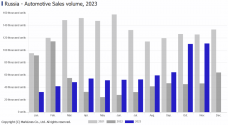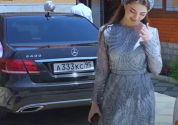number of Iranian students in Russia increased by 3.5 times. not disclose the total number but they were few thousands before. they are going to translate things into farsi.
Scientific and technical cooperation between Russia and Iran
November 30, 2023
On the second day of the III Congress of Young Scientists, a session “Scientific and technical cooperation between Russia and Iran” was held.
The moderator of the session, Assistant to the President of the Russian Federation Andrei Fursenko, noted in his opening remarks that “recently, cooperation between Russia and Iran has been successfully developing in many areas, including: scientific and educational cooperation in the natural and human sciences and scientific and technological cooperation in the nuclear field. Forums of university rectors of the two countries are held regularly, scientific cooperation between Russian and Iranian universities is growing, and student exchange is increasing. Russia provided 300 scholarships to Iranian students in April 2023. Interest in learning the Russian language is growing in Iran. We understand each other well. At the Astronomy Olympiad, Russian and Iranian participants each won 6 gold medals.”
Deputy Minister of Science, Research and Technology of the Islamic Republic of Iran Peyman Salehi noted that Iran is at the crossroads between the West and the East. This helps Iran overcome all the difficulties of today. “Iran is implementing various programs in the innovation sector and working for the benefit of not only its country, but the whole world. Iran is open to cooperation and joint research in many areas,” said Peyman Salehi.
Rector of Shahid Beheshti University Seyyed Mahmoud Reza Aghamiri believes that “scientific and technical cooperation between Iran and Russia has very good prospects in the nuclear field, biotechnology, engineering, oil and gas sectors. This also helps cooperation in the economic sphere.” He also said that “the University’s scientific and educational cooperation has been established with many universities around the world, and since 2015 with the Russian Moscow State University. M.V. Lomonosov on training students for the oil and gas industry, studying and disseminating Farsi."
Deputy Director of the Atomic Energy Organization of Iran, Director of the Research Institute of Nuclear Science and Technology Seyed Amir Hossein Fekhi said that “Iranian scientists are actively working in the fields of physics, mathematics and the humanities, solving problems in the field of biology, genetics and ecology to preserve the biodiversity of ecosystems in land, seas and oceans. One of the priorities is the development of isotopes for Smart drugs. Sanctions will not stop our research work. We are ready to work together with colleagues and partners and count on success. Joint participation in research programs will advance nuclear research to a higher level. And we must pass on our knowledge in this area to younger generations of researchers,” the speaker concluded.
Rector of the Moscow State Technical University named after N.E. Bauman Mikhail Gordin spoke about promising areas of cooperation with Iran in the field of quantum research, space research using small satellites, in the fields of energy, transport, robotics and information security.
Vice-Rector for Scientific and Innovation Work of Dagestan State University Alimurad Gadzhiev informed that there is an intensive rapprochement between Russia and Iran not only in the scientific and technological sphere, but also the active participation of Iranian scientists in the work of the Association of Universities and Research Centers of the Caspian Countries. The Association organizes interaction on scientific support for solutions to environmental problems throughout the Caspian region. On the Russian side, educational organizations from Dagestan, Kalmykia and Astrakhan are participating. The intensity of internships and mutual mobility of teaching staff and students has increased.
The head of the Eastern Cultural Center, senior researcher at the Institute of Oriental Studies of the Russian Academy of Sciences, Lana Ravandi-Fadai, in her speech, emphasized the importance of cooperation with Iran in the humanitarian sphere, which can lead to a strategic partnership. At the same time, she drew the attention of the session participants to existing problems in this area. She believes that “in Russia it is necessary to recognize Iranian scientific degrees and diplomas, create bilateral educational programs, resolve issues with the employment of Iranian teachers and create a unified scientific indexing and citation of Russian-Iranian articles.”
Vice-President of the National Research Center "Kurchatov Institute" Alexander Blagov said that in accordance with the agreement between the Iranian side and the National Research Center "Kurchatov Institute", Russia is implementing a large-scale program of joint research on nuclear topics, forming a single scientific and technological space in this area. “We need to use all possible mechanisms to intensify scientific and technical cooperation in promising areas between our countries,” the speaker noted.
Deputy Minister of Science and Higher Education of the Russian Federation Denis Sekirinsky emphasized the importance of Russia’s multifaceted cooperation with Iran and said that “the number of Iranian students has increased by 3.5 times.” At the same time, he announced that in January 2024, the Our Laba catalog will be available in Farsi, which will increase the productivity of Russian-Iranian scientific cooperation.
At the end of the session, three promising projects of Iranian colleagues were presented:
— a new drug “Deuterium” to release other drugs and reduce their toxicity in a living organism;
— research to determine the characteristics of neutron beams;
— development of new containers for storing and transporting spent nuclear fuel.
The Congress of Young Scientists is a key event of the Decade of Science and Technology in Russia, announced by the President of the Russian Federation Vladimir Putin in 2022. The Congress brings together representatives of leading scientific schools from different regions of Russia, scientific and educational organizations, authorities, industrial partners, bright leaders of domestic science, and most importantly - young scientists, winners of grant competitions, students and schoolchildren from Russia and other countries.
The organizers of the Congress of Young Scientists are the Roscongress Foundation, the Ministry of Science and Higher Education of the Russian Federation and the Coordination Council for Youth Affairs in Scientific and Educational Spheres of the Council under the President of the Russian Federation for Science and Education. The operator of the Decade of Science and Technology is ANO National Priorities.



